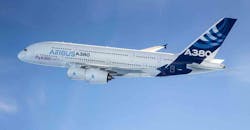Airbus SA, together France, Germany, Spain, and the U.K., announced revised terms on some of the loans it has received from those EU member states toward the development and launch of its A350XWB and A380 aircraft — loans that the World Trade Organization ruled recently were illegal subsidies.
In the ruling, WTO found the EU failed to honor multiple previous rulings and illegally subsidized Airbus with more than $22 billion over more than a decade. WTO ruled the EU must end the subsidies and address the damage resulting since 2006, when the trade suit was initiated by Boeing.
Airbus did not announce the revisions agreed with the four nations, but asserted it has addressed specific obligations cited by WTO in its ruling. It’s assumed that Airbus and the four nations are seeking to minimize any further penalties that trade organization my direct as a penalty for damages claimed by Boeing now that the subsidization has been asserted.
WTO had found that the EU and Airbus have achieved compliance with the majority of the financial support disputed by Boeing, but it considered some financial obligations required further adjustments. Those details are addressed by the revised terms, according to Airbus.
“We are confident that we have now achieved full compliance in the DS316 case as a clear demonstration of the will to ensure a fair-trade environment respecting international trade agreements,” stated Airbus general counsel John Harrison. “Airbus is looking forward to seeing the same constructive attitude and actions of the U.S. and Boeing in the upcoming DS353 case.”
The “upcoming case” refers to a parallel dispute raise by Airbus regarding alleged financial subsidies Boeing has received from Washington State. That ruling is still pending by WTO. It’s also assumed that EU is counting on the outcome of that case to force the U.S. into a negotiated settlement, to avoid a wider “trade war.”
This is because surrounding the Boeing-Airbus dispute is the growing expectation of retaliation by the U.S. When the WTO ruled in favor of Boeing earlier this month, U.S. Trade Representative Robert Lighthizer raised the possibility that the U.S. may impose tariffs on EU products to correct the harm done to Boeing by the Airbus subsidies.
“This report confirms once and for all that the EU has long ignored WTO rules, and even worse, EU aircraft subsidies have cost American aerospace companies tens of billions of dollars in lost revenue,” the USTR stated at that time. “Unless the EU finally takes action to stop breaking the rules and harming U.S. interests, the United States will have to move forward with countermeasures on EU products.”
About the Author
Robert Brooks
Content Director
Robert Brooks has been a business-to-business reporter, writer, editor, and columnist for more than 20 years, specializing in the primary metal and basic manufacturing industries.
